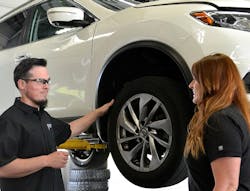Fall has arrived. The change of seasons means a change to business for many dealers. This also is the time when many start thinking ahead strategically for the next year.
With much of 2020 now in the rear view mirror, this will be a welcome diversion. However, with still more uncertainty in our path, thoughts for planning get even more complex: “Will we be impacted by a downturn again? How can we keep our business moving forward and growing?”
One question that always seems to be top of mind with dealers is what to do with your labor rate. This seems even more perplexing when considering the current business climate and the effect that COVID-19 has had on the business in general.
“Is this the wrong time to make adjustments?” you might be asking. “Do the risks outweigh the gain?”
I am going to suggest that the answer to both of those questions is no. There are so many misconceptions about labor rate that cause too many dealers to leave money on the table.
One of the first misconceptions is the need to be the cheapest in your area to be considered competitive. Being the cheapest does not make you competitive. It makes you cheap.
Cheap and competitive are not the same thing. The best way to help customers grasp this is to think of food. Let’s say, for example, I have a craving for a burger. I have so many options. Besides, a burger is just a burger, right?
All of you burger aficionados out there are screaming, “No!”
Let’s compare. I can get a half-pound burger at a fast food location, at a local bar and grill or at a high-end restaurant. Would these burgers be the same? No.
The one at the bar and grill is likely more seasoned, has better accompaniments and the location has a better atmosphere. If you order the burger at a high-end restaurant, all of these are even greater, likely with better-quality ingredients.
You might be thinking, “But a burger is a product. We’re talking about labor rate and that is very different.”
Well, yes and no.
In the fast food world, there are many places that have half-pound burgers, with the prices varying a bit, but all fairly close. The same could be said of the other levels I mentioned. But have you ever seen a good, quality neighborhood grill with a great atmosphere price their burgers to compete with the fast food places? Probably not.
If they did, it was probably not that great of a place to begin with because their quality could not compete with the other neighborhood grills. You see, your prices give an indication of the quality work that you do. If the quality and experience that you provide are better, you can charge more.
The same thing applies with your labor rate. If you insist on being the cheapest around, you are basically telling customers that your quality and the experience that they receive will be the same as the other cheap places. That is also a self-fulfilling prophecy, as you will likely not have the revenue to invest back into the business to keep it up-to-date.
Being competitive means offering a fair price for what you deliver, in terms of quality and customer experience. While you will likely not be able to charge what a new car dealership in your area charges, there is no reason you cannot be close, if you offer a similar level of service.
When considering your labor rate, consider the competitors around you who are offering the closest to what you provide. This is who you want to be compared against.
Do not think that your labor rate needs to be the same or a little lower than them, either. If you are confident that what you offer is better than the competition, don’t be afraid to charge a little more for it.
Let’s go back to our burger analogy. If there are two neighborhood grills that you are considering, are you willing to pay an extra dollar at the one that offers superior quality, plus a better atmosphere and overall experience? Most likely, the answer will be yes.
Let’s examine another big misconception, which is that your customers will push back if you raise your labor rate. I hear this one a lot. However, once owners actually do raise rates, they recognize that the only push-back they experienced was from internal sources, not customers.
What typically happens is that the employees of the location express concern that customers will go elsewhere if the labor rate is raised. They push so hard that the owner will back off and keep rates where they were.
The problem is that while your rate has remained the same, your cost of doing business has gone up. The cost of labor alone is a strong reason to evaluate and increase your labor rate.
Throughout the year, you are likely to give raises to those employees who stay with you. If you have to replace someone, I am willing to bet that the new person did not come in cheaper than the one who left.
The other reality here is that a small bump in labor rate, while potentially having a strong effect on your business, would have little impact on the customer.
Let me give you an example. Let’s say your labor rate is $100 and you want to raise it 5% to $105. If you have a job that totals $400, and the labor portion was two hours, you billed $200 in labor. That same job, after the labor rate increase, is now $410.
It is extremely unlikely that anyone would push back on that, particularly if the service and experience for the customer was exceptional. If you bill 6,500 hours in labor in a year, that same $5 increase would equate to an additional $32,500 in additional gross profit!
That goes straight to the bottom line, even if you did nothing else to manage your business.
The final misconception that I want to address is risk. I’ve had dealers state that it is “just too risky” to raise their labor rates, especially now. I would counter that it may be too risky not to consider it, particularly now.
The harsh reality is that all of you have seen operating expenses go up as a result of COVID-19.
You have had to add additional service protocols, invest in more personal protective equipment and constantly purchase more sanitizer and other cleaning agents. Whether we like it or not, these increased operating expenses are not going to go away.
Our business does not have the flexibility that other businesses have enjoyed in order to keep going. Many of you are already short-handed or are just at your optimum staffing model.
Laying a number of people off to save some money is just not possible to keep providing the service your customers need. Also, you cannot have employees work from home to save on office expenses. You need people on-site to take care of customer needs.
That small increase in your labor rate may be just what the doctor ordered to keep your business moving forward. Your customers rely on your business to keep them moving. That doesn’t change. Paying a couple dollars more for that, knowing that you are as committed to them as they are to you, is well worth it.
The fact that you are there when they need you is important. Ours is considered an “essential business” for a reason. This is why we need to do what we can to keep our businesses operating well.
This brings me to my final and most important point: is your business worth an increase in labor rate? Only you can answer that question, but I want you to seriously consider everything that was discussed here.
If you are delivering service and an experience that you feel is top-notch, are you charging appropriately? If you are confident enough in what your business delivers, do not be afraid to enact a slight raise in your labor rate right now, particularly if it has been a while since the last time you did so. You deserve it.
In a sense, although your customers will most likely not even know it, they deserve it, too. They get to continue to do business with a continually growing and improving service provider that is committed to delivering an outstanding level of value.
Don’t be afraid to get what you're worth. Now is the time to decide.
Tire industry veteran Jeff Morgan is the executive director of Dealer Strategic Planning, the DSP Group. He can be reached at [email protected] or (651) 846-9871. See www.20dsp.com for more.
About the Author

Jeff Morgan
Tire industry veteran Jeff Morgan is the executive director of TEN (Training and Education Network.) He can be reached at [email protected] or (651) 846-9871. For more, see www.mtdten.com
